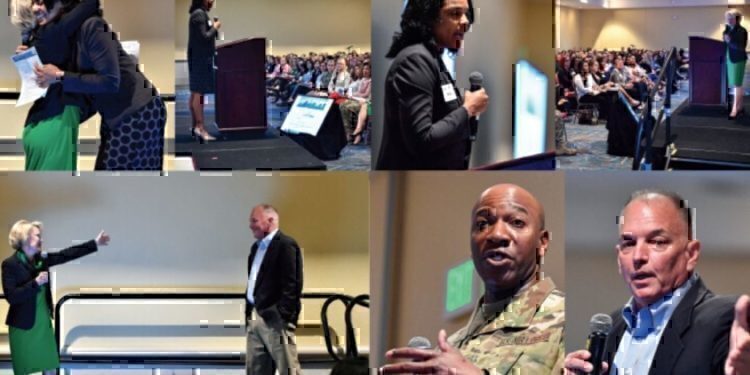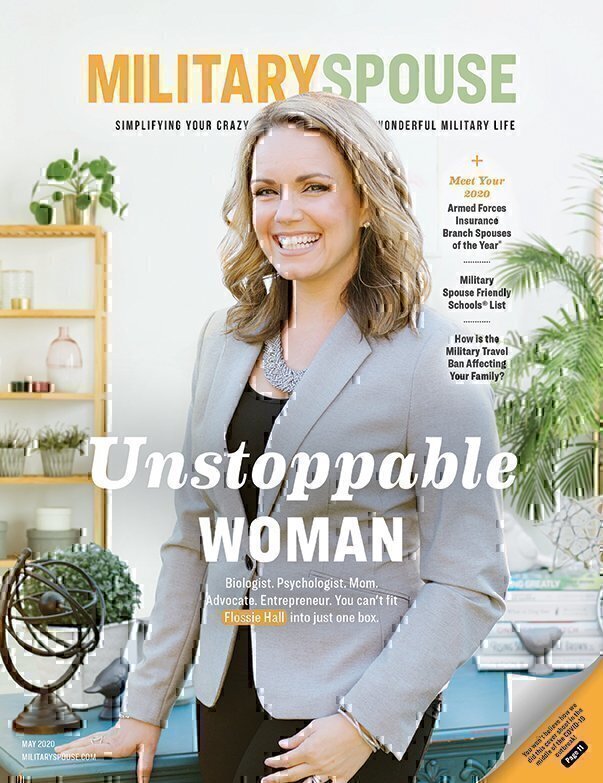Imagine our units without volunteers. Scary thought, right? Volunteers pump the heart that keeps us all going. But volunteers need support, too. Leadership should find ways to energize and strengthen them.
See inside the May issue of Military Spouse Magazine!
The Air Force’s top leadership has implemented a way to do just that for some of its most well-known volunteers: Key Spouses.
In February, Air Force Chief of Staff Gen. David Goldfein and his wife Dawn hosted the first-ever Key Spouse Conference in Orlando, Fla. The conference provided over 275 Key Spouses in-depth training and professional development.
“Key Spouses are one of our strongest and most important retention tools, and so we wanted to highlight them, embrace them and ultimately empower them,” Dawn Goldfein said.
Empower them it did. Key Spouses left with bigger networks, innovative ideas and a thirst for next year.
It’s Who You Know
Key Spouses help fellow spouses plug into networks when they inprocess or when a need arises. During initial training, Key Spouses are introduced to agencies and resources, but the Key Spouse Conference took this to the next level. It enabled Key Spouses to talk directly to multiple experts and learn more from agency representatives.
Katelyn Madison, the 2019 Air Force Key Spouse of the Year, felt that leadership was “taking that time to really invest in us.” She appreciated exchanging business cards with experts so she knew who to call later. Key Spouses also shared experiences, traded best practices and learned from each other. Goldfein encouraged them to build their contact lists. “These are all your new best friends,” she told them. Madison saw a “massive and cohesive unit” forming, saying that the conference’s encouragement of networking naturally discouraged competition, and instead promoted teamwork and productivity.
“If spouse leaders utilize their influence and knowledge for good, then we can see an epic force of shared brilliance, brainstormed solutions and a supportive connection with our own kind,” she said.
Growing as Leaders
The conference also educated and equipped Key Spouses with essential information and tools. A “hot topic” panel briefed Key Spouses on issues confronting military families, such as childcare and privatized housing. A leadership panel shared strategies to handle crises, manage operations and communicate. Madison served as the Key Spouse panelist and was impressed by the audience’s questions.
“There were lines out the door,” Madison said. “It gave Key Spouses a voice that they never really had at that kind of a level.”
But the conference wasn’t all briefings and panels. An inspirational speech from Maj. (Ret.) Mike McNamara (USMC) helped Key Spouses understand a different side of leadership. McNamara’s real-life stories deepened their understanding of crisis management and suicide prevention. He also provided hope and encouragement.
“He has seen a lot of trauma in his life, and he has used that for the good of helping others,” Goldfein said.
His powerful message of giving back and navigating hardship to a joyful end, she reflected, added a unique layer to Key Spouse training. Ultimately, combining practical strategies, networking opportunities and inspiration helped Key Spouses grow in their abilities as leaders.
Ready for the Road Ahead
The value of Key Spouses is, perhaps, immeasurable. Goldfein recalled a Key Spouse who coordinated large-scale disaster relief in response to Hurricane Michael. Another was instrumental in saving an airman from suicide. “Our Key Spouses are caregivers,” she said. “They’re good listeners, they’re connectors, they’re communicators and they’re advocators.” They’re “vehicles of change,” Madison said. The conference empowered them to be just that, and many left, revving their engines, raring to go.
____
Building Strong Units: Key Spouses’ Tips
1) “Develop webinars on hot topics.” Inform and connect without needing childcare! Key Spouses at Patrick Air Force Base had success with this. – Dawn Goldfein
2) “Create a spouse-specific roster.” Get to know spouses’ interests and needs, and match them to Key Spouses with similarities. Key Spouses at Ellsworth Air Force Base implemented this strategy. -Dawn Goldfein
3) “Maintain connection and conviction.” Remember why you became a Key Spouse to help you through tough times. – Katelyn Madison
4) “Be authentic.” Present your true self and make personal connections. This builds trust and reduces stress. – Katelyn Madison
5) “Connect, communicate and care.” Make it your “mission statement” to relate to service members and families in intentional ways. – Lynne B.
6) “Build with patience.” Understand that what worked before might not work next time, and each community is unique. – Yolanda S.
“As military leaders, we do the very best we can, but we cannot do it alone. Key Spouses stand shoulder to shoulder with us on one thing we do that is nothing short of sacred duty and a moral obligation: that is taking care of our airmen and families.”
Air Force Chief of Staff Gen. David Goldfein









